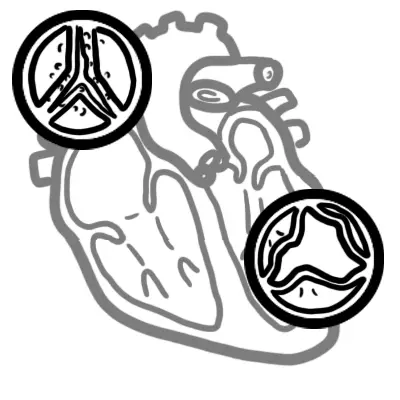Valvular Heart Disease


Valvular disease can come to clinical attention due to stenosis, insufficiency (regurgitation/incompetence) or both. Stenosis is the failure of a valve to open completely, which impedes forward flow. Insufficiency results from failure of a valve to close completely, thereby allows reversed flow. Doppler echocardiogram is the best technique for assessing patients with valvular heart disease, but often detects minor, unimportant abnormalities. The clinical consequence of valve dysfunction vary depending on the valve involved, the degree of impairment, the tempo of disease onset, and the rate and quality of compensatory mechanism. Valvular abnormalities can be congenital or acquired.
Aortic Valve Disease
Mitral Valve Disease
Aortic and mitral valve stenoses account for approximately 2/3 of all valve disease
| Clinical Presentation | ||
| Symptoms | Signs | |
| Mitral Stenosis | Dyspnea, reduced exercise tolerance, productive cough, palpitation, dysphagia (compressed by large left atrium) | Palmar erythmea, Malar flush, tapping apex beat |
| Mitral Regurgitation | Acute dyspnea and pulmonary congestion | Signs of Left-sided heart failure in late stages |
| Aortic stenosis | Exertional Syncope, Dyspnea and angina | Pulsus tradeus et parvus, narrow pulse pressure, sustained and powerful apex beat. |
| Aortic regurgitation | Similar t[[[o aortic stenosis | Waterhammer pulse, wide pulse pressure |
| Clinical Auscultation | ||
| Murmur | Heart Sound | |
| Mitral Stenosis | High pitched early-diastolic murmur | Loud S1 |
| Mitral Regurgitation | Pansystolic murmur radiates to the axilla | Soft S1 loud S2 |
| Aortic stenosis | Ejection systolic “crescendo decresendo” murmur radiating to the carotids | Soft S2 |
| Aortic regurgitation | Early diastolic murmur | Soft S2 |

Please confirm you want to block this member.
You will no longer be able to:
Please allow a few minutes for this process to complete.
Discussion